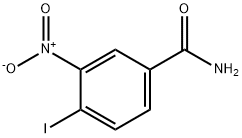Poly(ADP-ribose) polymerase (PARP) is a critical DNA repair enzyme involved in DNA single-strand break repair via the base excision repair pathway. PARP1 is activated by DNA damage. Inhibiting its activity has been linked to synthetic lethality and loss of either of the breast cancer susceptibility genes, BRCA1 and BRCA2. BSI-201 is an irreversible, noncompetitive inhibitor of PARP1 that disrupts binding between PARP1 and DNA by interacting with the DNA binding domain. It produces rapid apoptosis in various cancer cell lines with IC50 values ranging from 40-128 μM and is not toxic in Syrian hamsters at doses as high as 200 mg/kg. In phase II clinical studies, BSI-201, in combination with carboplatin and gemcitabine, has produced promising results in "triple-negative" breast cancers, increasing median overall survival from 7.7 months to 12.3 months.

